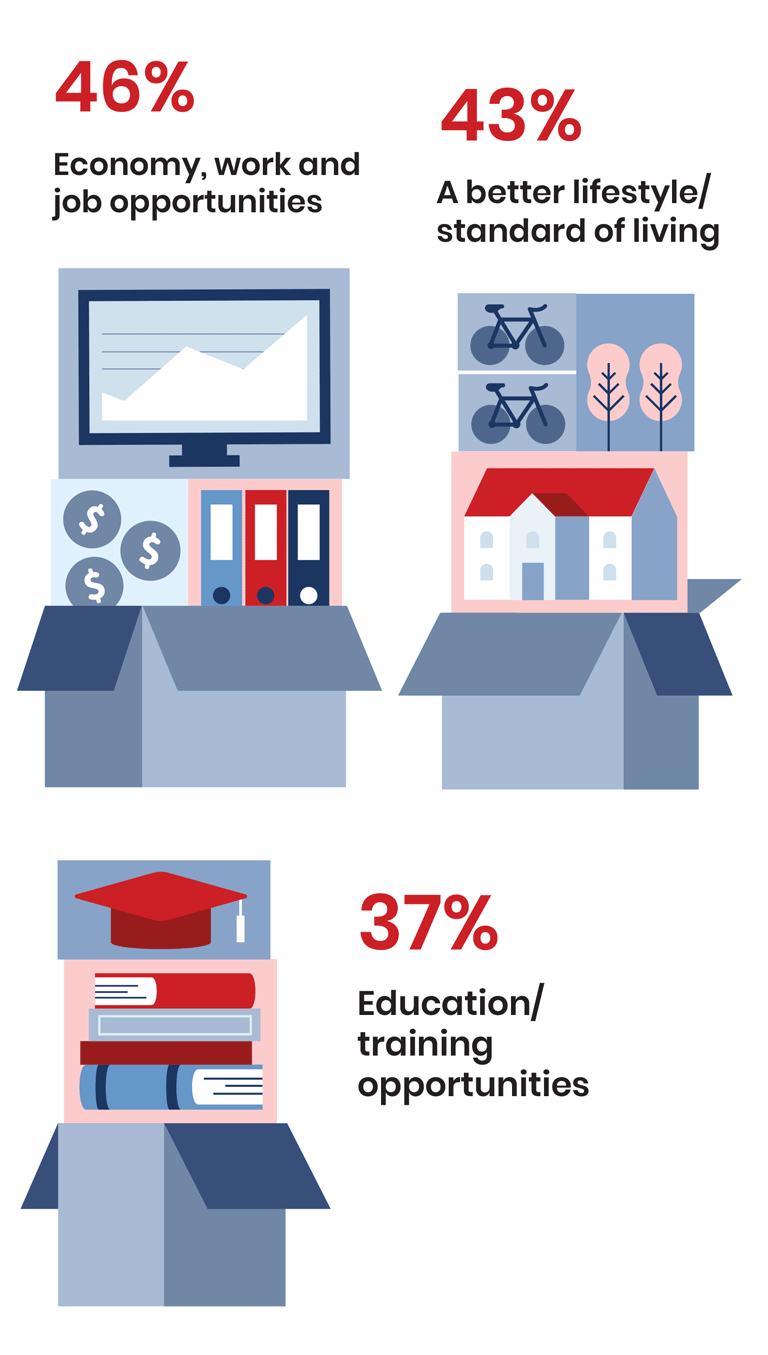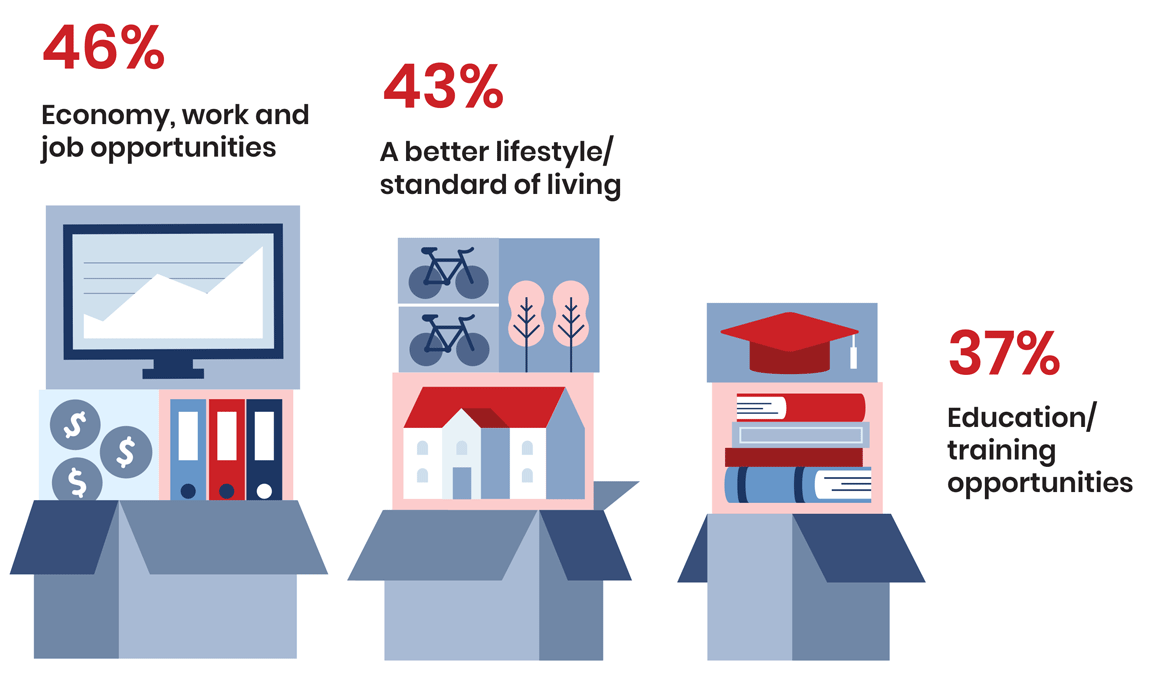Before packing, check this list of items prohibited from entering a particular country or region.
South Africa
Economy, work and job opportunities are the top reason for South Africans relocating internationally (54.1%), followed by a better lifestyle or standard of living (40.5%), education or training opportunities (35.7%), to be with family or a partner, for love (24.3%) and finally, to experience a new culture (16.5%).
These come before reasons such as for political reasons and personal safety (14.4%), for a better climate, (12.6%), healthcare or medical needs (9.6%), and for financial/tax reasons (8.4%). The pandemic has played a limited role as motivation in the migration of South Africans, as only 5.4% of people have relocated due to the pandemic.
Reasons for moving vary depending on duration of stay, number of moves
In comparison, for South Africans who have relocated internationally more than once, the top three reasons for their previous move were also for economy, work and job opportunities (45.7%), for a better lifestyle or standard of living (42.9%) and for education or training opportunities (37.1%).
While the top three reasons remain the same, experiencing a new culture has moved up the list; and to be with family, a partner, or for love has moved down the list. Interestingly, 20.0% of South Africans have relocated in the past to learn a new language, compared to only 8.7% in more recent moves.
Most who relocated did so more than 5 years ago (33.6%), while 16.8% relocated 2–3 years ago, 14.7% relocated 6–12 months ago, 13.8% relocated 4–5 years ago and 12.0% relocated 13–18 months ago.
The largest group of respondents who would relocate overseas are those staying for the long-term (3-5 years) at 38.2%, while 24.7% are permanent moves with no further relocations for the foreseeable future, 19.4% are medium-term (1-2 years) and 8.2% are short-term (less than a year).
When looking at expats’ most recent relocations, 41.7% were returning to their home country, 38.7% were moving away from their home country, and 19.5% were moving between non-home countries.
In terms of favoured destinations, respondents who were thinking about or planning to relocate internationally ranked their top three countries of consideration as the UK (24.3%), US (22.8%) and Australia (12.7%), while other notable countries include Germany (6.3%) and Italy (3.4%).

Fig 11 - Top reasons for South African respondents to move (those having relocated more than once)
Q: Thinking about your previous moves, what was your reason(s) for relocating internationally? [Multiple responses allowed]
South African movers on the quest for greater cultural experiences
Nearly one-fifth of South African respondents say their main reason for moving was to experience a new culture, and with nearly half in search for a better lifestyle.
For South Africans, the pandemic has not dented plans for relocating internationally - seeing as 39% are more likely to consider doing so after travel resumes.
Barriers to moving abroad
Having explored the motivations, it is important to identify the challenges when it comes to moving abroad. Unsurprisingly, Covid-19-related restrictions or concerns were cited as the top reason why respondents who were planning to relocate internationally cancelled their plans.
While 20.9% of South Africans have postponed plans to relocate internationally, 19.3% have adjusted their plans to relocate, while 9.5% have cancelled and 8.8% have relocated as planned. In total, 41.5% of South Africans surveyed do not have plans to relocate overseas.
For those that had their relocation plans adjusted or postponed but still went ahead or plan to go ahead, the top reason for this happening was due to Covid-19-related restrictions lifting or related concerns resolved (39.2%). This was closely followed by realising they still wanted to go ahead (38.9%), followed by travel restrictions or border closures lifting (34.1%), and adjusting plans to allow for the move (27.7%).
Meanwhile, for those cancelling the move, the top reason was because of Covid-19-related restrictions or concerns (50.0%) while the least cited reason was because they realised they weren’t comfortable with it (6.5%). This suggests that cancellations are more related to inability, rather than a decreasing desire to move.
Other reasons noted for cancelling international relocation are that the timings weren’t right (35.2%), travel restrictions or border closures were being enforced (25.0%), issues with cost of immigration or moving (23.2%) and circumstances no longer allowed for a move (20.4%). Another 13.9% encountered a delay or situation that could not be resolved, while 12.0% changed their minds.
Covid-19 impact on mobility
and moving plans
Covid-19 has not reduced the willingness of respondents to consider relocating internationally, as 83.7% of those with plans or considerations to relocate when travel resumes have either relocated as planned, or still intend to do so.
For those cancelling their international relocation, the top reason was because of Covid-19-related restrictions or concerns (50.0%). However, for South Africans, the pandemic has not dented their motivation to think about or plan for relocating internationally after travel and movement resumes - seeing as 39.3% are more likely to consider relocating internationally.
At the same time, 39.4% are neither more or less likely to consider relocating internationally, while 21.3% are less likely to consider relocating internationally due to the pandemic.
Interestingly, 60.7% of respondents currently living abroad have not considered moving back home since the start of the pandemic, while 39.3% have considered it.
The South African survey sample consisted of 1,008 South Africans who have a passport; 289 are considering or would like to move abroad, while 103 are expats.
Get the global perspective
Our full Global Movement Report reveals that despite cancellations occurring, worldwide 3 in 5 of respondents who had their relocation plans adjusted or postponed intend to go ahead with their move. Meaning people are waiting for restrictions to lift... does this mean we will see a surge in relocations?







